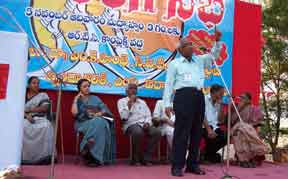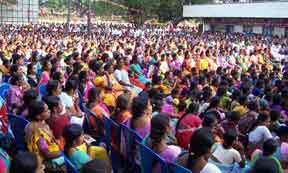 People's Democracy
People's Democracy
(Weekly
Organ of the Communist Party of India (Marxist)
No. 48
November 26, 2006
(Weekly
Organ of the Communist Party of India (Marxist)
|
Vol.
XXX
No. 48 November 26, 2006 |
AICCWW (CITU) HOLDS EIGHTH CONVENTION
Working Women To Play Greater Role In TU Movement

M K Pandhe addressing the public rally in Vishakapatnam
Hemalata
THE eighth convention of the All India Coordination Committee of Working Women (CITU) was held on November 3-5, 2006 in D Sarada Nagar (Ukkunagaram) in Visakhapatnam. A total of 418 delegates from Andhra Pradesh, Arunachal Pradesh, Assam, Chattisgarh, Delhi, Himachal Pradesh, Karnataka, Kerala, Madhya Pradesh, Maharashtra, Orissa, Rajasthan, Tamil Nadu, Uttaranchal, Tripura and West Bengal participated in the convention. They represented more than 30 industries like plantation, beedi, construction, home-based industries, food processing, garments, handloom, electricity, water authority, transport, public sector undertakings, private hospitals, domestic workers, anganwadi employees etc. A noteworthy feature of this convention was the participation of women workers from the CITU affiliated unions. Unlike in the earlier occasions, where the significant participation was of middle class women employees like those from insurance, banks, state and central government departments who were discharging some responsibility in the CITU, this time women workers from the unorganised sector constituted the majority of the delegates.
Indubala Das, member of the AICCWW and member of the CITU general council from Tripura unfurled the CITU flag amidst thunderous slogans. M K Pandhe, president, Arati Dasgupta, vice president, Kanai Bannerjee, and Roja, secretaries and Hemalata, convenor of the AICCWW led the delegates in paying floral tributes to the martyrs, as ‘Praja Natya Mandali’ group activists sang revolutionary songs.
An eight-member presidium consisting of Ranjana Nirula from CITU centre, Dhanalakshmi (Andhra Pradesh), Saroj (Himachal Pradesh), Leelavathy (Karnataka), M K Kamalamma (Kerala), Raji (Tamil Nadu), Panchali Bhattacharya (Tripura) and Nirupama Chatterjee (West Bengal) conducted the proceedings of the convention. S Punyavati, general secretary of the reception committee welcomed the delegates. M K Pandhe inaugurated the convention.
In his inaugural address, Pandhe explained the efforts made by the CITU since its inception, to address the specific problems of working women and bring them into the mainstream trade union movement. He impressed upon the need to intensify struggles against imperialist globalisation and its attacks on the working class by strengthening the unity of all sections of the exploited masses. He exhorted the working women from all sectors to make efforts in forging this unity.
The women members of the working committee of CITU along with Shibani Sengupta acted as the steering committee of the convention. The convention elected a resolutions committee with A R Sindhu as the convenor and a credential committee with Shubha as the convenor.
Anwara, vice president of the All India Democratic Women’s Association (AIDWA) greeted the convention. Congratulating the CITU for paying special attention to the problems of working women, she called for greater coordination between the CITU and AIDWA in taking up the problems of working women.

A view of the working women attending the public rally
CONVENOR’S REPORT
Hemalata presented the convenor’s report. The report exposed the false claims by the advocates of the neo-liberal policies that globalisation provided increased job opportunities for women. It dealt in detail about the problems of women workers like unequal wages, non-implementation of legal benefits like maternity benefits, crèche facilities, increasing incidence of sexual harassment at work place, the attempts of the government to lift the ban on night-shift work for women without providing adequate protection or proper transportation facilities etc. The report strongly criticised the government for its dilatory tactics in the introduction of the ‘Unorganised Sector Workers’ Bill’, the Bill against sexual harassment at workplace and the ‘Women’s Reservation Bill’.
The report also noted the increasing women’s membership in CITU at the national level and also in many states. At the all India level as per the latest available annual returns, women’s membership in CITU has increased to 30 per cent. At the same time this was not reflected in the presence of women in the decision-making bodies, particularly at the national level. The report included the demands of working women and also made some important suggestions to the CITU for further improving the work among working women.
A total of 41 delegates from all the participating states took part in the discussion on the convenor’s report. While supporting the report they narrated their own experiences while working among the women workers in different industries, to strengthen the observations made in the report. It was significant that some women workers, like domestic workers and plantation workers spoke very confidently and assertively. They not only spoke on their problems but also about the dangers of globalisation policies, about the state of organisation etc and gave some good suggestions for increasing women’s membership in CITU. Almost all the speakers emphasised the need for deploying women whole timers for the work among working women. Some points were also raised on the status and structure of the Coordination Committees of Working Women and their role.
Arati Dasgupta introduced the special paper on ‘Women Workers in the Unorganised Sector’. She explained the various problems faced by the women workers in the unorganised sector. Observing that more than 96 per cent of working women were in the unorganised sector, she emphasised the importance of the CCWWs in organising them.
This paper was discussed in state-wise groups and representatives from almost all the states reported the observations of their respective states. All the speakers welcomed the decision to have a separate discussion on organising the women in the unorganised sector and agreed that the CCWWs need to pay special attention on this important task. Many speakers gave important suggestions like creating awareness about the existing welfare benefits among the unorganised sector, addressing their social problems and residential problems etc to organise the women workers in the unorganised sector.
While summing up the discussion, Hemalata thanked the delegates for their suggestions. Explaining the status of the CCWWs, she reiterated that the Coordination Committees of Working Women are not separate organisations of working women, but a part of CITU. The CCWWs at different levels were the sub committees of CITU and should function under the guidance of the respective CITU committees. The suggestions or decisions of the CCWWs need to be ratified by the CITU. She emphasised that the CCWWs should identify the sectors where women were working in large numbers, study their problems and demands and make suggestions to the CITU committees on how to organise them and it is the concerned CITU committees that need to take the decision on the concrete steps to organise them. She also called upon the state CCWWs to identify working women activists and prepare plans for their development as trade union leaders. The report was unanimously adopted with the clarifications.
RESOLUTIONS
The convention passed several important resolutions demanding the government to introduce the ‘Unorganised Sector Workers’ Bill’ along with a separate comprehensive bill for the agricultural workers in the ensuing winter session of parliament. It also demanded the introduction of the Women’s Reservation Bill in its present form in the winter session. In separate resolutions the convention condemned the increasing attacks on labour, demanded changes in the SEZ Act, effective implementation and extension throughout the country of the employment guarantee Act. The convention expressed concern at the increasingly anti-worker tendency witnessed in the recent judgements of the courts, including the apex court. The delegates expressed their support with thunderous slogans when the resolution calling for the success of the December 14 all India general strike was introduced. Resolutions on the agrarian crisis, on the deteriorating food security etc were unanimously passed by the convention.
Kanai Bannerjee, who has been associated with the AICCWW since the last several years, observed that the discussions reflected the increasingly important role being played by working women in CITU. He told that 27 years back the CITU started its efforts to organise women workers on their specific demands and over the years it gained many experiences. The present character of the CCWWs has evolved through these experiences. It was necessary to review the work on the basis of these experiences. Pandhe made the concluding remarks and assured that the secretariat of CITU would discuss in depth the work of CITU among working women, the role and functioning of the AICCWW and state level CCWWs and how to strengthen it further.
IMPRESSIVE RALLY
An impressive procession and rally, in which thousands of mid-day meal workers, community health workers, anganwadi employees and others participated, was held on November 5. Roja, convenor of the state CCWW presided over the rally. M K Pandhe, Brinda Karat, MP and vice president of AIDWA, Hemalata, Punyavati, vice president of the AP state committee of CITU, spoke in the rally. Brinda Karat criticised the government for ignoring the plight of the common people after coming to power. She demanded that food security for the poor should be ensured by strengthening the PDS.
The convention formed a new AICCWW (CITU) comprising 45 members with Hemalata as the convenor.